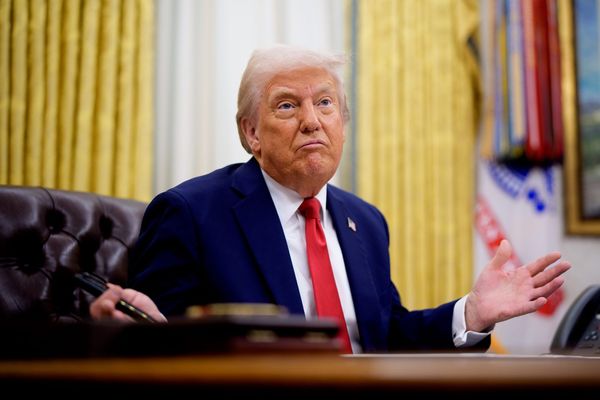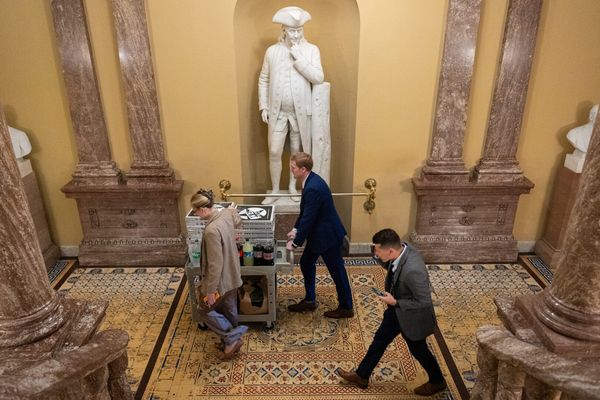
The Biden administration urged Prime Minister Justin Trudeau’s government Thursday to use its federal powers to end the truck blockade by Canadians protesting the country’s COVID-19 restrictions, as the bumper-to-bumper demonstration forced auto plants on both sides of the border to shut down or scale back production.
For the fourth straight day, scores of truckers taking part in what they dubbed the Freedom Convoy blocked the Ambassador Bridge connecting Windsor, Ontario, to Detroit, disrupting the flow of auto parts and other products between the two countries.
The White House said Homeland Security Secretary Alejandro Mayorkas and Transportation Secretary Pete Buttigieg spoke with their Canadian counterparts and urged them to help resolve the standoff.
Federal Public Safety Minister Marco Mendicino said Royal Canadian Mounted Police reinforcements are being sent to Windsor, Ottawa and Coutts, Alberta where another border blockade is happening.
Mr Trudeau met virtually with leaders of Canada’s opposition late Thursday and said he spoke with Windsor’s mayor. Trudeau’s office said there is a willingness to “respond with whatever it takes” to end the blockades.
Conservative Ontario Premier Doug Ford, meanwhile, moved to cut off funding for the protests by successfully asking a court to freeze millions of dollars in donations to the convoy through crowd-funding site GiveSendGo. Ford has called the protests an occupation.
Canadian officials previously got GoFundMe to cut off funding after protest organizers used the site to raise about 10 million Canadian dollars ($7.8m). GoFundMe determined that the fundraising effort violated the site’s terms of service due to unlawful activity.
With political and economic pressure mounting, Windsor Mayor Drew Dilkens announced the city will seek a court injunction to end the occupation.
“The economic harm is not sustainable and it must come to an end,” he said.
In the US, authorities braced for the possibility of similar truck-borne protests inspired by the Canadians, and authorities in Paris and Belgium banned road blockades to head off disruptions there, too.
The US Department of Homeland Security said in a bulletin to local and state law enforcement agencies that it has received reports that truckers are planning to “potentially block roads in major metropolitan cities” in a protest against vaccine mandates and other issues.
The agency said the convoy could begin in Southern California as early as this weekend, possibly disrupting traffic around the Super Bowl, and reach Washington in March in time for the State of the Union address, according to a copy of Tuesday’s bulletin obtained by The Associated Press.
The White House said the department is “surging additional staff” to the Super Bowl just in case.
The ban on road blockades in Europe and the threat of prison and heavy fines were likewise prompted by online chatter from groups calling on drivers to converge on Paris and Brussels over the next few days.
The Ambassador Bridge is the busiest US-Canadian border crossing, carrying 25 per cent of all trade between the two countries, and the effects of the blockade there were felt rapidly.
Ford said its Windsor engine plant reopened Thursday after being shut down on Wednesday because of a lack of parts. But the factory and the company’s assembly plant in Oakville, Ontario, near Toronto, were operating at reduced capacity, the automaker said.
On the US side, GM sent the first shift home two hours early Thursday at its Flint, Michigan, heavy-duty pickup truck plant due to parts shortages.
Stellantis cut short the first shift Friday at its Jeep plant in Toledo, Ohio, due to parts shortages.
Also, Honda will temporarily stop production on one assembly line during the day shift Friday at its plant in Alliston, Ontario. It’s because of border delays. US plants are scheduled to run normally Friday.
Toyota said three of its plants in Ontario closed for the rest of the week because of parts shortages, and production also had to be curtailed in Georgetown, Kentucky.
Michigan Gov Gretchen Whitmer urged Canadian authorities to quickly resolve the standoff, saying: “It’s hitting paychecks and production lines. That is unacceptable.”







